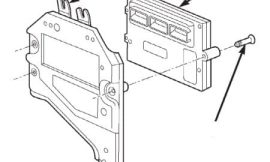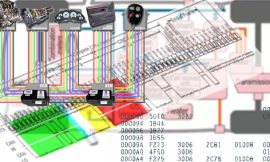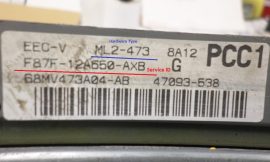Last updated on September 28th, 2023 at 11:30 am
The Engine Control Module (ECM), also known as the engine control unit, is a pivotal component in modern automotive design. Often described as the vehicle’s brain, it oversees a range of crucial functions, from fuel mixture to emission control. However, accurately diagnosing issues with the ECM presents a significant challenge due to its interconnected nature. From vague symptoms to intermittent faults, ECM problems can be elusive, confounding even seasoned automotive professionals.
II. Symptoms of a Failing ECM
A failing ECM can manifest in several ways, often mimicking issues that might seem unrelated at first glance. Here are some common symptoms that signal ECM problems:
- Check Engine Light: The check engine light may illuminate or blink, indicating that the ECM has detected an engine issue.
- Poor Performance: Reduced engine power, sluggish acceleration, or a decrease in fuel efficiency can all suggest a failing ECM.
- Irregular Engine Behavior: This could include random misfires, stalling, or an engine that refuses to turn over.
- Transmission Issues: Automatic transmission problems such as abrupt shifting or difficulty changing gears can be caused by ECM failures.
- Intermittent Electrical Issues: Unexplained electrical issues such as gauge malfunctions, erratic warning lights, or sudden loss of certain features can also be linked to ECM problems.
III. Potential Causes of ECM Failure
The complexity of the ECM means that there are many potential points of failure. Some common causes include:
- Power Surges: A sudden spike in voltage can fry the ECM’s delicate circuitry.
- Water Damage: Exposure to water or other fluids, such as coolant leaks, can damage the ECM and its components.
- Corrosion: Over time, corrosion can build up on the ECM’s connectors and cause malfunctions.
- Excessive Heat: High temperatures can damage the ECM and its electronic components, leading to failure.
IV. Diagnosing ECM Problems
Diagnosing issues with the ECM requires specialized equipment and expertise. However, some preliminary steps can help identify potential problems, such as:
- Scanning for Error Codes: Using an OBD-II scanner can reveal error codes that point to specific issues with the ECM.
- Checking for Loose Connections: Ensuring all wiring harnesses and connectors are securely plugged in can eliminate simple glitches.
- Testing Voltage and Grounds: Verifying proper voltage and grounds to the ECM can help identify power-related issues.
- Inspecting Physical Damage: A visual inspection of the ECM for any signs of physical damage, such as water or heat damage, can provide valuable clues.
V. ECM Replacement with Flagship One
Replacing a faulty ECM can be a daunting task due to its intricate nature and the numerous vehicle-specific variations. This is where Flagship One can be an invaluable partner. As a leading provider of ECMs, Flagship One boasts an extensive inventory of programmed plug-and-play units, which simplifies the replacement process. Their team utilizes advanced diagnostic tools to analyze your faulty ECM and determine the precise make and model you require. This ensures that the replacement ECM will be an exact fit for your vehicle. Once the part is identified, they provide a preprogrammed unit that can be installed directly, circumventing the need for additional programming or calibration. Therefore, Flagship One facilitates a seamless and efficient ECM replacement, helping to get your vehicle back on the road swiftly and safely.
VI. Conclusion
The Engine Control Module plays a crucial role in ensuring proper engine function and overall vehicle performance. As technology continues to advance, the complexity of ECMs will only increase, making it essential to have a solid understanding of their operation and potential issues. With proper diagnosis and repair procedures, automotive professionals can effectively address ECM problems and keep vehicles running smoothly.

















